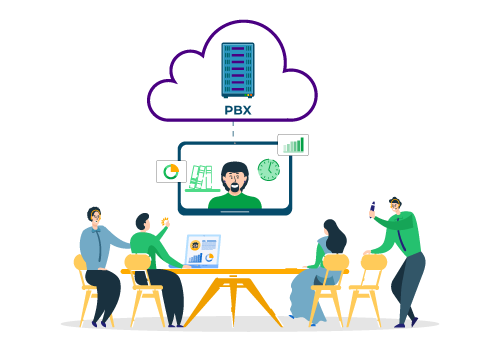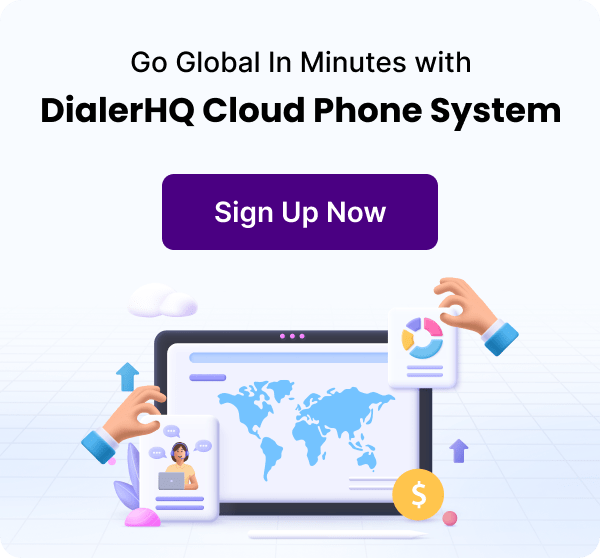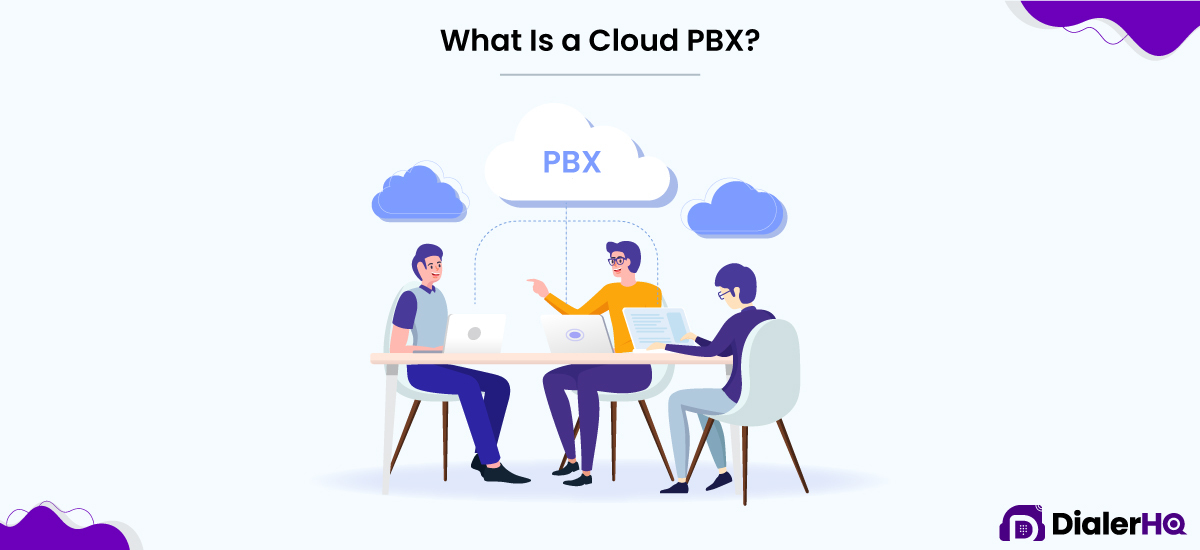Senior Writer: Paras Kela
In the past, businesses were quite happy with traditional phone systems located in their offices. However, due to certain limitations, businesses started to consider upgrading to cloud-based phone systems that are more advanced and flexible.
Cloud PBX (Private Branch Exchange) is a communication system that utilizes the Internet and offers numerous advantages to companies of all sizes. It is a virtual phone system that is hosted remotely rather than being located on-premises.
According to research, The cloud PBX market was USD 5.12 billion in 2020 and is expected to reach USD 14.76 billion by 2028, with a CAGR of 14.17% between 2021 and 2028. All telephony infrastructure remains secured in various data centers run by service providers.

"By using Cloud PBX, your firm can boost client engagement, optimize communication operations, and finally grow a devoted customer base. Calls from clients may be managed properly with the help of Cloud PBX technologies such as call routing, voicemail, and call forwarding, ensuring that no critical inquiries are neglected."
Through this, businesses no longer need to rely on physical hardware. Despite this fact, some businesses still have concerns. They worry about the safety of their data stored online instead of in their offices.
They also question if online systems are as reliable as traditional landline connections. If you have similar questions in your mind, this article is for you. It will explain the advantages of using a cloud phone system in your company and how you can benefit from switching from a traditional system.
What is a Cloud PBX?
A cloud PBX is a phone system for businesses that connect employees to a telephone network through a cloud-based service. Unlike traditional systems that rely on physical equipment, a cloud PBX manages and stores everything online.
Communication is highly revolutionized by this cutting-edge solution, both internally and externally. It truly distinguishes itself with its additional features and flexible call management options, including queues and calming music during downtime.
The cloud-based PBX, also known as hosted or virtual PBX, is a modern approach to PBX functionality that leverages the power of the Internet. The days of relying on the software installed on physical servers are long gone; instead, all software and data required for cloud PBX reside securely in the ethereal realm of the cloud.
The fact that cloud PBX relies on the Internet rather than copper wires is what really sets it apart from traditional office configurations. Any device that has an Internet connection can serve as your system’s gateway, allowing access from any location in the world.
How does a Cloud PBX Work?
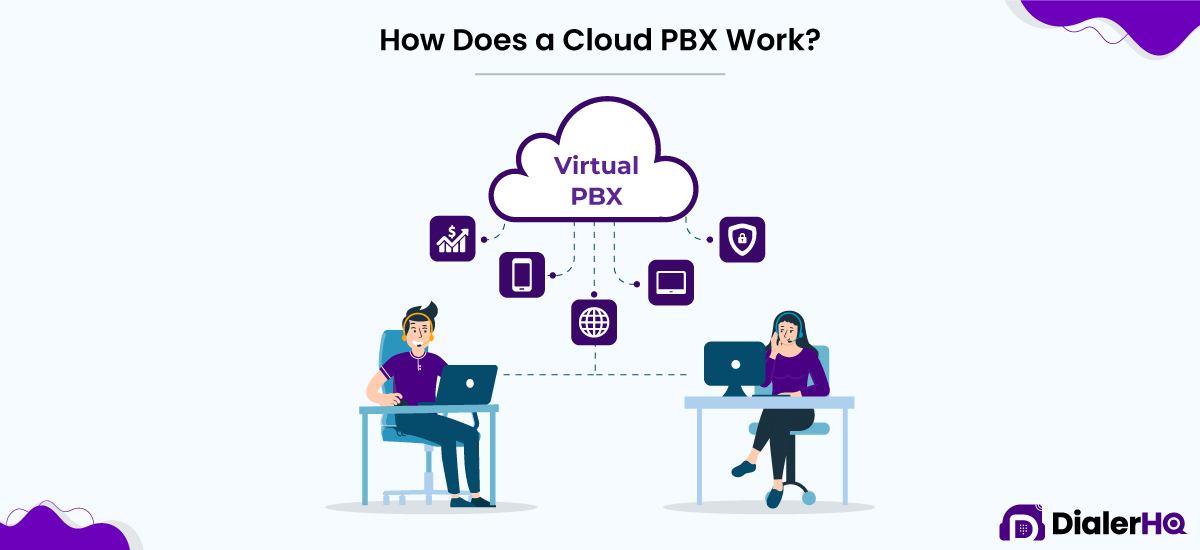
A virtual PBX runs smoothly by utilizing the power of VoIP technology, which takes advantage of the wonders of the voice-over-Internet protocol. Through this, people can easily connect with only an Internet connection, revolutionizing the way calls are made and received.
VoIP deeply transforms audio files into vibrant digital sound waves. These travel across the vast expanse of the Internet to their intended destination by embracing the digital world. However, cloud PBX enthusiasts should make sure they have enough bandwidth to ensure a smooth call flow through their Internet connection. Implementing robust cloud security governance is pivotal for safeguarding data and ensuring a resilient communication framework in cloud-based systems.
With a cloud phone system, you can enjoy the ease of a streamlined setup, which eliminates the need for those outdated entanglements. Furthermore, the beauty of a cloud-based system is its constant accessibility.
This allows employees to access its capabilities from any location with adequate connectivity. The confines of a physical office can no longer limit the workforce, allowing them to explore productivity from multiple locations.
Is Cloud PBX the Same as VoIP?
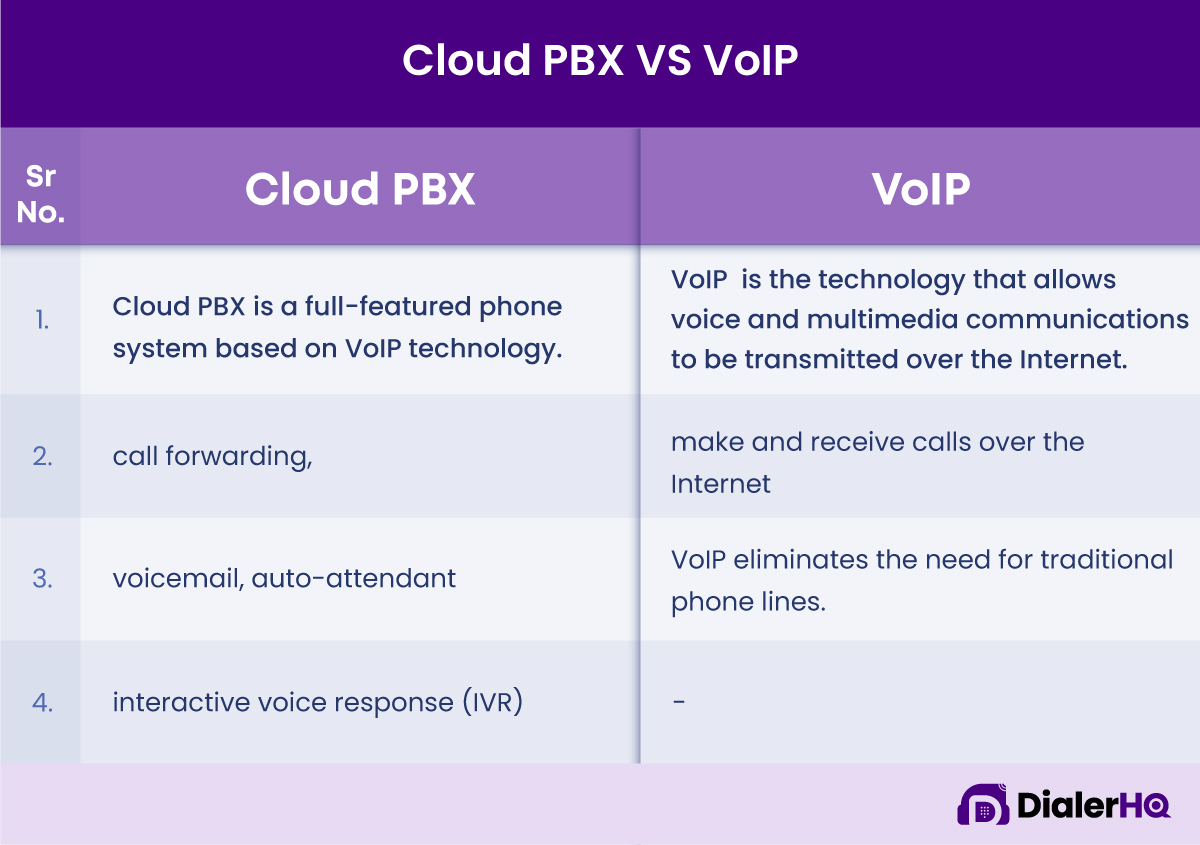
VoIP, or Voice over Internet Protocol, is the technology that allows voice and multimedia communications to be transmitted over the Internet. This method converts analog audio signals into digital packets that can be transmitted over IP networks. By allowing users to make and receive calls over the Internet, VoIP eliminates the need for traditional phone lines.
Cloud PBX, on the other hand, is a full-featured phone system based on VoIP technology. PBX originally referred to a business’s private phone network. However, with the rise of cloud computing, PBX systems have evolved into cloud-based solutions.
Cloud PBX features and functionalities that extend beyond simple voice calls. It uses the cloud’s computing power to provide multiple call management features such as intelligent call routing, call forwarding, voicemail, auto-attendant, interactive voice response (IVR), and more.
These cloud-based systems, which are typically hosted in data centers and managed by service providers, relieve businesses of the responsibility of maintaining physical infrastructure.
VoIP is the foundation for Internet-based voice communication, but Cloud PBX combines VoIP with additional services and features to create a complete phone system. These solutions frequently integrate with other business software and tools, allowing for seamless communication and teamwork across multiple channels.
Cloud PBX extends VoIP by providing a full phone system with cutting-edge features, whereas VoIP technology serves as the underlying mechanism for transmitting voice over the Internet. By leveraging the benefits of the cloud, cloud PBX provides businesses with scalability, flexibility, and cost savings.
Subpoints: Cloud PBX vs. Hosted PBX
| Cloud PBX | Hosted PBX |
|---|---|
| Highly Scalable | Less Scalable |
| On-premises hardware is not required | Specific hardware required |
| Cloud PBX works on monthly subscription fees | Hosted PBX charges for ongoing maintenance, support, and hardware |
Virtual PBX, also referred to as cloud based PBX, is hosted and managed by a third-party service provider and runs entirely in the cloud. Businesses no longer need to spend money on on-premises hardware because of this. Businesses can access and manage their phone system through an Internet connection without on-site physical infrastructure because the provider maintains the entire phone system in their data centers.
Hosted PBX is also hosted and managed by a third-party provider, but it is typically implemented on specific hardware that is situated on the company’s premises. While the hardware is still physically present on-site, the provider manages and maintains it.
Scalability is one of the most common benefits of cloud PBX. As their needs change, businesses can easily scale up or down their phone system. The cloud-based platform allows for the addition and deletion of phone lines and extensions remotely, offering flexibility that is especially useful for businesses that experience seasonal fluctuations or rapid growth.
Hosted PBX might not be as scalable as other options because it is based on real hardware in the office. When compared to the scalability offered by Cloud PBX, scaling up the system may require the purchase of additional hardware or upgrades, which can be time-consuming and expensive.
The cost structure is yet another area of difference. The number of users or extensions needed is typically based on the monthly subscription fee for cloud PBX. The provider handles upgrades and maintenance, which lowers capital expenditure. In contrast, hosted PBX may charge for ongoing maintenance and support in addition to up-front hardware costs.
Because the provider takes care of system maintenance, updates, and security, a cloud PBX system offers convenience in terms of management and maintenance. This frees up businesses to concentrate on their core competencies rather than phone system administration. Hosted PBX may require some level of business involvement in equipment maintenance and troubleshooting, even though it is still managed by a provider.
Flexibility All-Around What Are the Benefits of a Cloud PBX?
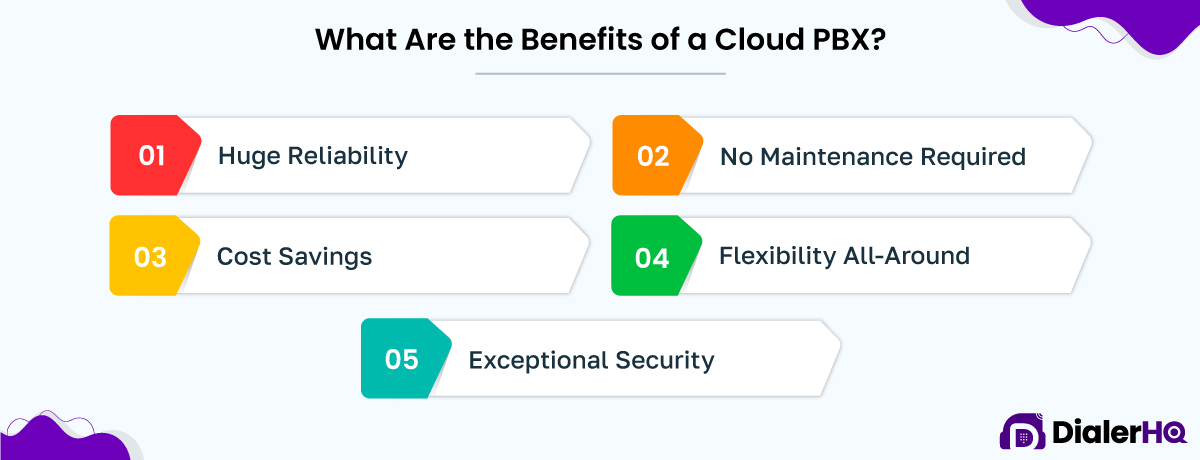
Cloud PBX systems have transformed the way businesses handle internal and external communication. Unlike traditional on-premises PBX systems, which require significant hardware investments and ongoing maintenance, cloud PBX provides a number of advantages. Some of them are written below; let’s take a look at them!
1. Huge Reliability
The huge reliability of cloud PBX for small business is one of the most prominent benefits. Cloud-based systems are powered by a network of redundant servers spread across multiple data centers.
Because of the system’s robust infrastructure, downtime is kept to a minimum. Along with this, communication is never disrupted if one server or data center fails. Reputable cloud PBX providers also provide Service Level Agreements (SLAs), which guarantee high uptime and availability and provide businesses with peace of mind.
2. No Maintenance Required

The maintenance of an on-premises PBX system can be costly and time-consuming. It includes multiple tasks such as hardware installation, software updates, routine maintenance, and troubleshooting. The cloud PBX eliminates the need for such maintenance tasks.
The service provider handles all technical issues, such as system maintenance, software patches, and hardware upgrades. This allows businesses to concentrate on their core business operations rather than dealing with complicated telephony infrastructure.
3. Cost Savings
Significant cost savings opportunities are presented when comparing cloud PBX to traditional PBX systems. Multiple investments in costly hardware, such as servers, switches, and phones, and associated installation costs are required for on-premises systems to function.
Cloud PBX, on the other hand, operates on a subscription model that does not require an initial capital outlay. Businesses can scale their communication system to meet their needs while only paying for the services they use. Furthermore, because calls are made over the Internet, cloud PBX eliminates long-distance call fees, lowering communication costs even further.
4. Flexibility All-Around

Adding or removing phone lines or extensions can be difficult and time-consuming with conventional systems, necessitating actual infrastructure changes. Cloud PBX helps businesses to easily scale their communication system up or down depending on their needs.
A user-friendly web portal makes it a mere cakewalk to add new lines or extensions. Businesses that experience growth or seasonal fluctuations in communication needs will benefit the most from this adaptability.
5. Exceptional Security
For businesses, security is of utmost importance, and cloud PBX provides excellent security measures. To protect sensitive communication data, reputable cloud PBX providers use strong security protocols like encryption, firewalls, and intrusion detection systems.
Additionally, cloud PBX providers frequently apply the most recent security patches to their systems and carry out regular audits to guarantee compliance. Businesses can improve their overall security posture without incurring additional costs by utilizing the knowledge and resources of cloud PBX providers.
Custom Caller ID Features to Look for in a Cloud PBX Phone System
When it comes down to choosing the best cloud PBX system, there are multiple features to look for. Some of the most common ones are written below. Let’s take a look at them!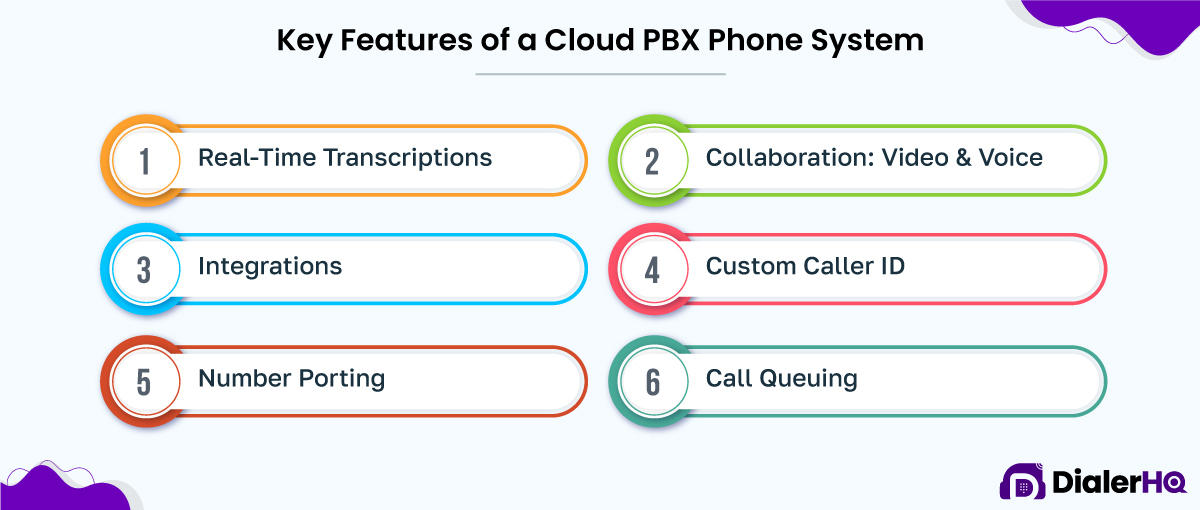
1. Real-time Transcriptions
Real-time transcriptions are a must-have feature in a cloud PBX phone system. During a phone call, this feature automatically converts spoken words into text, providing users with a real-time transcription of the conversation.
There are numerous advantages to using real-time transcription. These include taking notes during a call, ensuring accuracy in important discussions, and assisting individuals with hearing impairments.
With instant access to transcriptions, users can easily review and search through previous conversations, resulting in increased productivity and improved communication clarity.
2. Collaboration: Video and Voice

A complete cloud PBX phone system ought to provide powerful collaboration features that include both voice and video capabilities. Teams can communicate face-to-face using video conferencing, regardless of where they are physically located.
This promotes collaboration and increases productivity. Users can seamlessly switch between audio and visual communication modes thanks to integrated voice and video capabilities, ensuring efficient and adaptable communication over a variety of channels.
To ensure streamlined team collaboration, look for a system that supports high-quality video and voice calls, screen sharing, and virtual meeting rooms.
3. Integrations

A cloud-based phone platform has the advantage of integrating seamlessly with various software applications, such as Microsoft Office 365 and CRM solutions. Users can access their phone system directly from within these applications, streamlining communication processes.
Businesses can consolidate customer interactions and gain a comprehensive view of customer history by integrating with CRM solutions. This integration improves efficiency and customer service, and offers a unified communication experience.
4. Custom Caller ID
Custom caller ID is a useful feature that allows businesses to personalize outgoing calls by displaying specific information on the caller ID display of the recipient. It enables businesses to improve their brand image and professionalism by presenting a consistent and recognizable identity when making calls.
Custom caller ID allows you to display your company name, department, or any other information you want instead of just the phone number. This feature has the potential to significantly increase response rates and ensure that recipients recognize and trust incoming calls, thereby improving overall communication effectiveness.
5. Number Porting

The ability to port existing phone numbers is essential when switching to a cloud PBX phone system. By using number porting, you can move your current phone numbers from the old cloud-based system to the new service provider.
With this feature, business communications are always consistent, and there is no longer a need for contacts to be informed about a new phone number. It makes it easier for customers and clients to contact you using familiar contact information while streamlining the migration process and minimizing disruptions.
6. Call Queuing
Call queuing is a valuable feature that helps with the efficient management of high call volumes. When several callers dial in at the same time, call queuing places them in a virtual queue until an available agent can take their calls.
This feature prevents callers from receiving busy signals or long wait times, resulting in increased customer satisfaction and fewer missed opportunities. To keep callers highly engaged while they wait for assistance, look for a cloud PBX phone system with customizable call queuing options.
7. Virtual Attendant (IVR)

A virtual attendant, also known as an Interactive Voice Response (IVR) system, guides callers through a series of menu options using pre-recorded voice prompts. It allows callers to self-direct their calls to the appropriate department or extension. This extensively reduces the need for manual call transfers and increases call routing efficiency.
It is critical to select a cloud PBX phone system with a customizable IVR system so that you can create custom menus and routing options tailored to your company’s specific needs. An IVR system’s quick and accurate call routing improves the customer experience while saving time for both callers and staff.
8. Call Recording
Businesses can easily record and store incoming and outgoing calls using this useful feature. This functionality is crucial for quality control, legal compliance, training, or even just keeping accurate records of significant conversations. Choose a cloud PBX phone system that offers safe and convenient call recording features.
Comparison of 5 Best Cloud PBX Providers
| Brand Name | Key Features | Pricing | Free Trial |
|---|---|---|---|
| DailerHQ |
|
| 10 Days |
| CallHippo |
|
| 10 Days |
| RingCentral Contact Center |
|
| 14 Days |
| Nextiva Contact Center |
|
| 10 Days |
| Dialpad |
|
| 14 Days |
5 Best Cloud PBX Providers
The best cloud PBX provider to choose will depend on a number of things. These primarily take into account your unique business requirements, budget, and desired features. Below mentioned are the top 5 cloud PBX providers. Let’s dig deep!
1. DialerHQ

The best virtual phone system for small businesses is DialerHQ. It is a virtual business phone number provider app with all of the necessary communication tools needed by companies. Without a SIM card, you can make calls and send messages using this app.
Moreover, the app can easily be set up in minutes and has a very user-friendly UI. There is no additional hardware or equipment needed for this app to function.
Key Features
- Top-notch call quality
- International calling & texting
- Call recording & call routing
- No SIM card required
- Seamless business phone line setup
Pros and Cons
- This software offers a free trial of 10 days.
- It offers exceptional customer service to resolve all its customers’ concerns in minimal time.
- It provides a wide range of advanced calling features along with smooth integration.
- This software is well-known for its high-tech call recording.
- At times, this software speeds down and causes difficulties.
- Its pricing is a bit higher, making it difficult for startups to get their hands on it.
Pricing
As an enterprise-specific solution, DialerHQ caters exclusively to large teams or organizations. Connect with the DialerHQ sales team at [email protected] for personalized quotes, or start a free trial for first-hand experience.
2. CallHippo
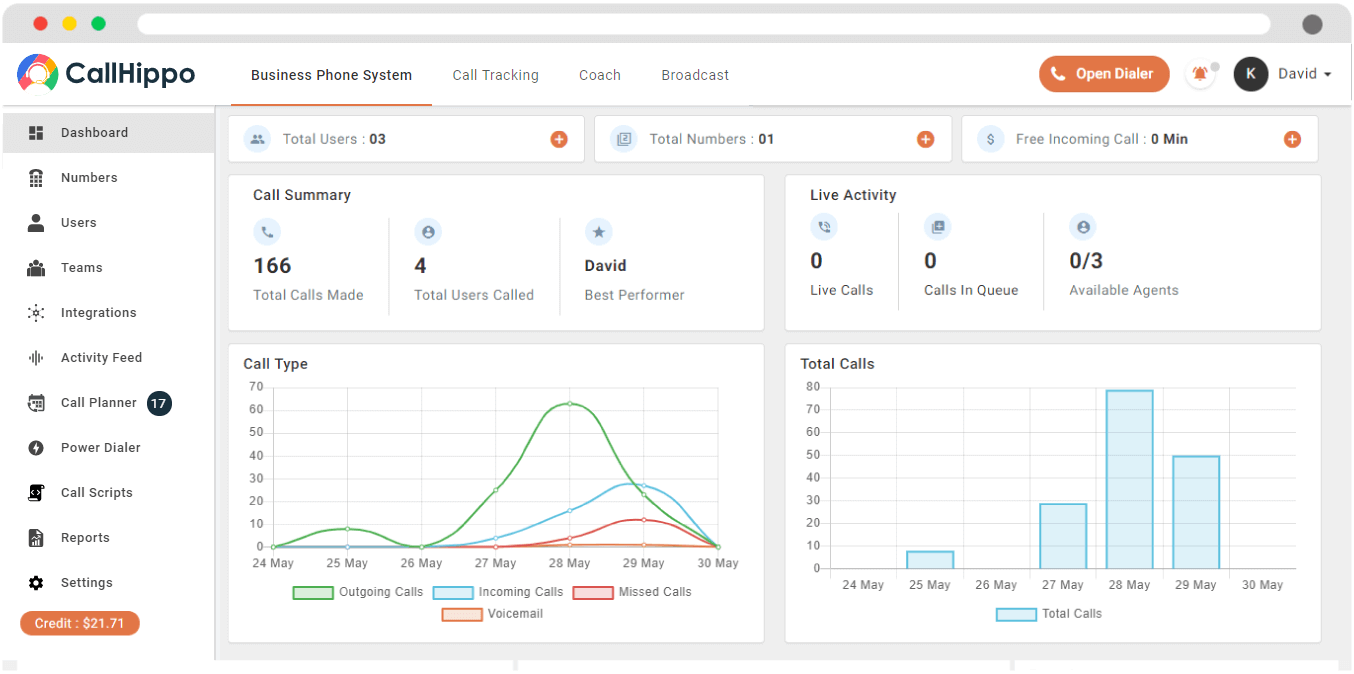
CallHippo is a leading provider of cloud PBX solutions, catering to businesses looking for efficient cloud management of their communication systems. This software provides businesses with real-time data on team performance and customer interactions.
This essential data enables businesses to optimize their customer support operations in various ways. Businesses that use this software can make data-driven decisions and proactively improve their customer service and support.
Key Features
- Auto attendant
- Call tracking
- Call recording
- Power dialer
- Call queuing
Pros and Cons
- This software offers a complete 10-day free trial.
- It can easily integrate with multiple features.
- Being very easy to use and set up, new customers are increasingly accommodating with this software.
- This software can easily be customizable, which helps suit different business needs seamlessly.
- This software allows for metered calling only.
Pricing
- Bronze: $16 per user/month
- Silver: $24 per user/month
- Platinum: $40 per user/month
3. RingCentral

RingCentral, a leading cloud PBX provider, offers a comprehensive and feature-rich solution to businesses of all sizes. With this platform, users can take advantage of a number of cutting-edge features designed to improve communication and streamline business processes.
RingCentral guarantees prompt solutions to any problems or issues that may arise by providing assistance around-the-clock via phone, chat, or email. This makes their customer support one of the best ones.
Key Features
- Single Sign-on (SSO)
- Robust call monitoring
- Interactive voice response (IVR)
- Call recording
Pros and Cons
- This platform provides both advanced APIs and integrations.
- It functions easily on various devices, such as desktop computers, tablets, and smartphones.
- Users enjoy a seamless experience thanks to its third-party integrations.
- Despite all its exceptional features, this software doesn’t provide any free trial.
- It offers various CRM integrations but only as add-ons.
Pricing
- Essentials: $19.99 per month
- Standard: $27.99 per month
- Premium: $34.99 per month
- Ultimate: $49.99 per month
4. Nextiva
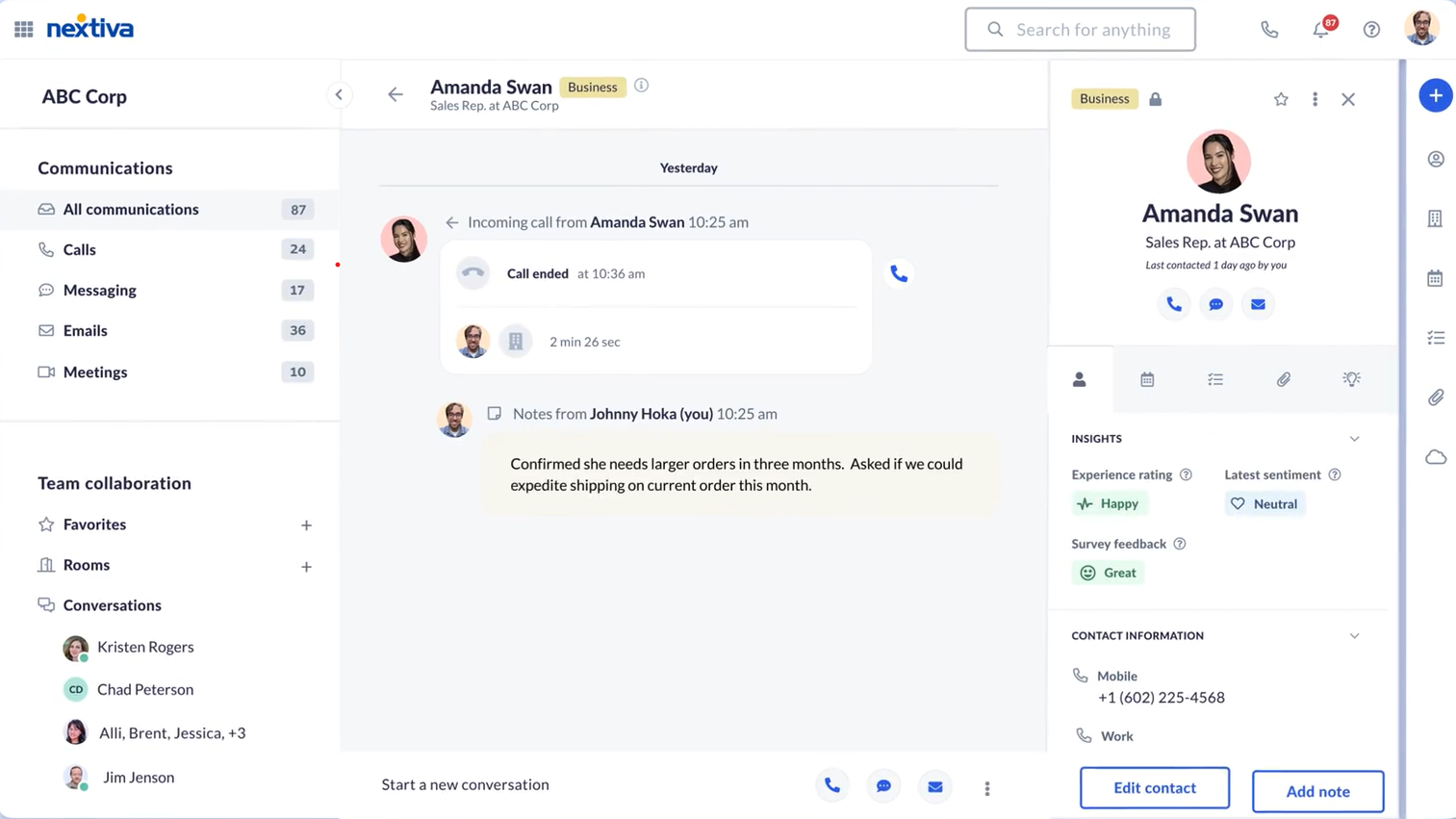
Nextiva, a top cloud PBX provider, provides businesses with efficient call tracking capabilities, out to designated agents, and real-time reports on agent dispositions. This level of visibility and control ensures that the call center operation is streamlined and optimized.
Businesses can efficiently manage and improve their communication systems by leveraging Nextiva’s cloud-based suite of call center tools. This ensures seamless interactions with customers.
Nextiva’s comprehensive solution includes the tools needed to streamline communication processes, resulting in increased efficiency, higher customer satisfaction, and, ultimately, better business outcomes.
Key Features
- Voicemail-to-email notifications
- Video conference recording
- Free online faxing
- Interactive voice response
Pros and Cons
- This software offers Unlimited calling within the United States and Canada.
- Its 24/7 customer support helps customers get their queries resolved easily.
- This software provides VoIP hardware which is available for both sale and lease.
- This software’s services are relatively not suited for small-sized businesses.
- It provides a wide range of CRM integrations but only as add-ons.
Pricing
- On request.
5. Dialpad
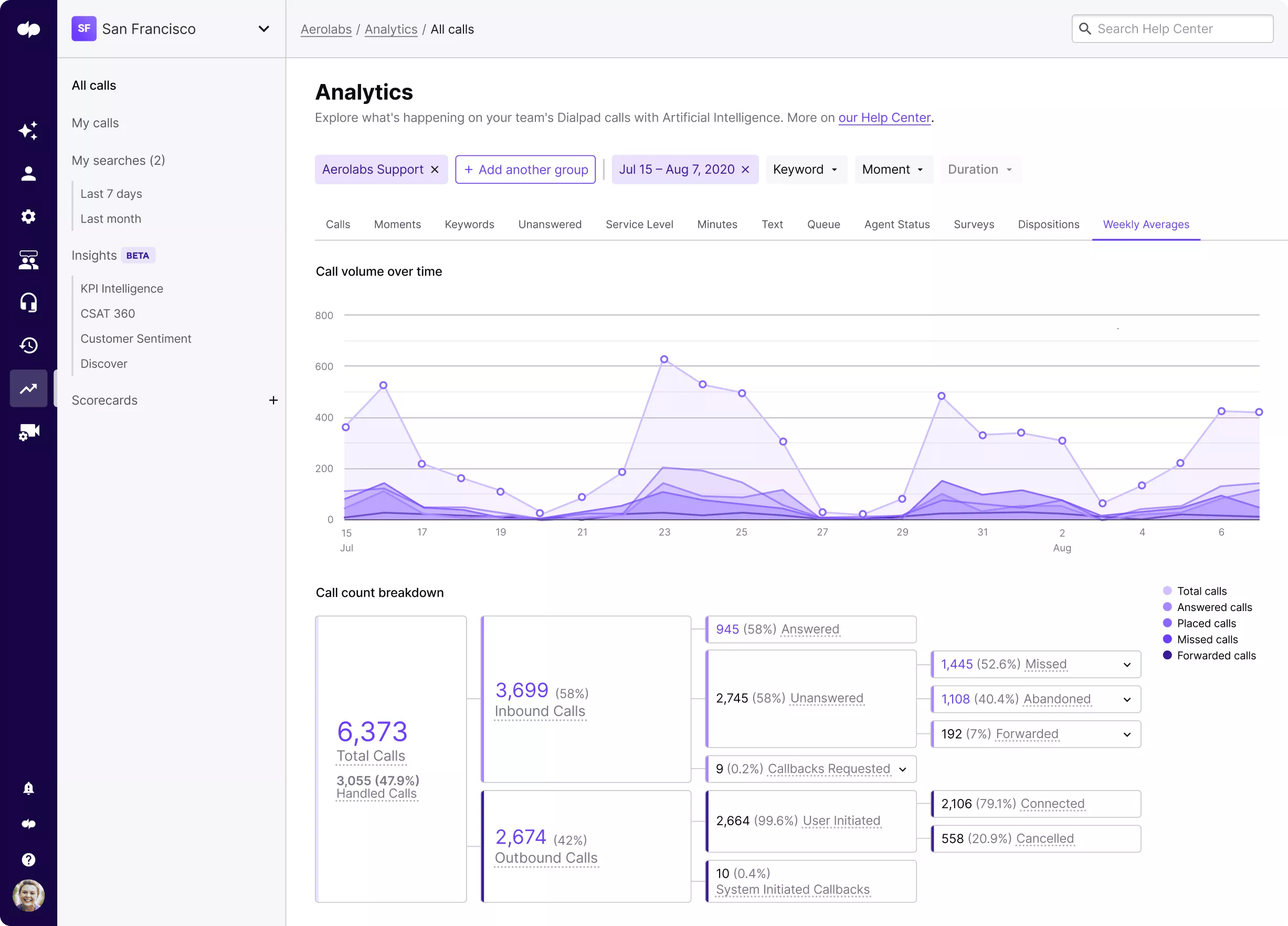
Leading cloud PBX provider, Dialpad provides businesses looking for a cloud-based phone system with a powerful and feature-rich solution. This software’s cloud-based infrastructure enables companies to manage their communication systems without the need for on-site hardware.
Dialpad provides businesses with a complete communication solution for their needs thanks to its cloud-based infrastructure, feature-rich platform, and integration abilities.
Key Features
- Inbound reporting
- Offers speech coaching
- Spam prevention
- Three-way calling
Pros and Cons
- This software offers Unlimited calling within the United States and Canada.
- Its 24/7 customer support helps customers get their queries resolved easily.
- This software provides VoIP hardware which is available for both sale and lease.
- This software’s services are relatively not suited for small-sized businesses.
- It provides a wide range of CRM integrations but only as add-ons.
Pricing
- Standard: $15/month (minimum one user)
- Pro: $25/month (minimum three users)
- Enterprise: Custom price (minimum 100 user license)
Conclusion
Cloud PBX is a cutting-edge phone system that operates in the cloud and offers numerous advantages and benefits to businesses. Cloud PBX provides scalability, flexibility, cost savings, and advanced features by eliminating on-premise hardware and relying solely on Internet connectivity.
Because of it, businesses can more easily manage their communication systems, adapt to changing needs, and support remote workers. Implementing Cloud PBX strategically can significantly improve and elevate any company’s communication capabilities.
FAQs
A traditional telephone system that is installed and maintained on-site is referred to as an on-premise PBX. Hardware and specialized IT staff are needed to manage and update the system. Instead of requiring on-site equipment, cloud PBX runs in the cloud and is managed by a third-party provider. The system has a web-based interface that users can use to access and manage.
SIP is used to create and control real-time communication sessions over IP networks. Both on-premises and cloud-based PBX systems are compatible with it. The hosting and delivery model for the phone system, which makes use of SIP or other communication technologies, is referred to as cloud PBX.
Switching to cloud PBX services saves money by avoiding initial hardware costs and ongoing maintenance costs. Because of its scalability and adaptability, businesses can easily add and remove users and features.Because cloud PBX supports remote and mobile working, employees can stay connected from any location. It is compatible with other business applications and includes cutting-edge features that increase productivity. It also ensures business continuity during outages or natural disasters by rerouting calls.
Cloud PBX stands for Cloud Private Branch Exchange. It alludes to a phone system that operates in the cloud by utilizing hosted infrastructure and the Internet. Cloud PBX replaces traditional on-premise hardware by providing features, scalability, and cost savings.

Paras Kela is an accomplished IT professional with 7+ years of industry experience, including 4+ years as a dedicated content writer. His expertise lies in crafting informative blogs on VoIP and cloud telephony, among other technical subjects. Outside his professional pursuits, he cherishes quality time with loved ones, indulges in watching documentaries, and finds solace in gardening.
Updated : March 19, 2024

Subscribe to our newsletter & never miss our latest news and promotions.
